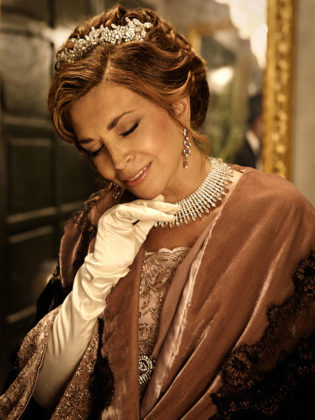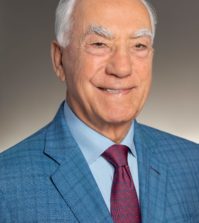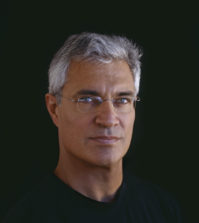- FOKION AVGERINOS – DR. IKE: Athletic Director, Youth Mentor, and Healer
- American Hellenic Institute’s Golden Jubilee Celebration
- Leadership 100 Concludes 33rd Annual Conference in Naples, Florida
- Louie Psihoyos latest doc-series shocks the medical community The Oscar–winning director talks to NEO
- Meet Sam Vartholomeos: Greek-American actor
Mimi Denissi: Sharing Important History to Shape Our Future
Acclaimed Actress, Director, Producer, Writer, and Translator Mimi Denissi has starred on stage and screen, translated many works, and created innumerable productions for Greek audiences. But the development of projects that bring important and often little-known history to the masses is her passion. And it’s precisely that passion that fuels this gifted creator.
Denissi did not aim for such a career. Raised in Athens in the footsteps of the ancients, she studied Byzantine and Modern History at the University of Athens. She’s had a lifelong interest in history and culture, and from a young child, aspired to a career in Academia. But the fates had other ideas. Her first roles were on television, but she was soon drawn to the stage. Over the years, she’s performed in more than 50 international plays, and even acted alongside Greece’s “National Star”, Aliki Vougiouklaki. American audiences first met Denissi in the 1978 film, ‘The Greek Tycoon’, starring Anthony Quinn.

Acclaimed Actress, Director, Producer, Writer, and Translator Mimi Denissi
She formed a production company with her ex-husband, and seven years later, created her own company. And in this capacity, she’s translated, produced, and acted in many international productions, including ‘Amadeus’, ‘Philadelphia Story’, ‘The King and I’, ‘Funny Girl,’ and many others.
“New audiences need to experience these works, and even better in their native languages,” Denissi explained. “This is what we call ‘Cultural Diplomacy’. You cannot just stick to your own traditions and literature. You must explore what’s been written of importance in other languages. It’s a way for people of other nations to communicate, to learn about each other.”

Before it became trendy, Denissi wrote and acted in several historical plays highlighting strong female characters, like Laskarina Bouboulina and Empress Theodora. “I did this because I believe in that. There are many unique female figures that people should know.”
She creates vivid characters, so human, we see ourselves in them. She also is drawn to telling stories that illuminate history, things about the world and the human experience that we often overlook, and sometimes refuse to see. Her background in Byzantine and Modern History and the ability to speak five languages inform this work. Most of all, her capacity to bring these human stories, the characters, to life on paper and onto the stage and screen has made her a prominent force in Greece.

‘SMYRNA’

On December 8, 2022, Fathom Events presented screenings of ‘Smyrna’ in 700 U.S. theaters. It was the #4 top film that evening; PHOTO: MANOS PR
Perhaps dearest to her heart is ‘Smyrna’, a film she wrote, produced, and starred in, which has taken the world by storm. The ‘Smyrna’ story began with a play. “It was a huge success, but no matter how good a play is, once done, it’s often forgotten. Not everyone can see it, and interesting topics go unnoticed worldwide. I decided to make ‘Smyrna’ a movie, so others realize that before the Holocaust, there was another genocide, which affected Armenians, Assyrians, and Greeks. The Armenians have started to do this with films like ‘The Promise’, but the Greeks had not. We needed to tell this story, so people will know.” She added, that like the Jewish community, we must band together to get our stories onto the international stage.
Several years in the making, the script took three years to write and two additional years to prep. Filmed in three months, on location in Mytilene and Chios, plus an incredible set built in Faliro, outside of Athens, that brought the Smyrna harbor to life, production took place during a very difficult time in Greece. Covid cases were at their peak. While other international productions were shut down, ‘Smyrna’ continued. “After all the injustice, all the souls that were lost, I believe it was Divine protection. We never had to shut down. Something truly miraculous happened.”
Denissi said she is so proud of her talented cast. She’s worked with many of them for years, with the exception of the Turkish actors. “I wanted the characters to be authentic. A Turk is best to portray a Turk, same with the British woman in the film. I’m so grateful for them. They are terrific people and terrific actors. I was very careful with how I portrayed the Turks in the film. I wanted to tell an accurate story, to show the mistakes of the Greeks and Europeans, too. I didn’t know how the Turkish actors would feel, but they said it was objective.”

History does repeat itself, highlighted in the film’s opening, where an older woman and her granddaughter sit on a beach in Mytilene, as refugees arrive from Syria. The granddaughter asks why the Greeks must help them, and her grandmother reveals their family’s story of life in Smyrna—how a glorious and cosmopolitan city became the site of one of the biggest horrors in human history. And made them refugees. This isn’t something we learn in school, and if you ask the average person, they aren’t aware of what happened in Asia Minor in the early 1900s, the atrocities that Adolph Hitler cited as his inspiration for the Holocaust.
The first-rate, Hollywood-style production and the efforts of an immensely talented cast and crew bring the story to life. The heartbreaking story follows a prominent Greek family in Smyrna. A family who has befriended and lived alongside Turks for generations. They, along with Armenians, Assyrians, and people from other cultures and religions, lived peacefully for centuries. When Mustafa Kemal’s “Turkey for Turks” campaign reaches Smyrna, Christians are persecuted, forced from their homes. Women are raped, and the once grand city is burned to the ground, while many boats docked in the harbor, ordered by their respective countries to not take in anyone trying to flee the town. Denissi stars as Filio, the family matriarch, who is determined to keep her family together and safe.

The epic film is powerful and heartbreaking, gripping and emotional. It’s the kind of film that changes you. People identify with different emotions and events, and that’s what makes it transcend the screen. It touches us all.
In December, Fathom Events coordinated one-day screenings in 700 cities in the U.S. It was the #4 top film in the U.S. on that day. It also screened at the Metropolitan Museum of Art, a rare occurrence for a film, which she called “a great honor for Greece”, and for her. It’s now screening in Australia, and likely will return to the States. Some of the top American universities now screen it to facilitate discussion on the subject.
“One hundred years later, these tragedies are still happening. Life goes on. We don’t cry about the past, but we must not forget, because if we know the past, we can have a better future. If we ignore it, we will continue to make the same mistakes again and again.”
She added that sadly, her dear friend, Actress Olympia Dukakis, did not live to see the film. “Olympia was a great influence on me to tell this story. It was her dream for people around the world to know what happened in her ancestral land. Her son came to New York for the screening, and it meant so much.”
Denissi is currently in negotiations with several streaming platforms, so ‘Smyrna’ may continue to reach more audiences. “Only once the screenings are done can we finalize where it will stream.”

AFTER ‘SMYRNA’
Surely, it seems difficult to follow such an extraordinary production, but Denissi is up to the task. Next, she’ll stage part II of the play ‘Smyrna, My Beloved’ in ancient theaters. It’s about the Asia Minor refugees’ arrival in Greece. “I don’t like to be far from the theater for too long, and we had to stop during Covid.”
She’s also penning a sequel to the film, ‘Smyrna’, which follows Filio and the next generation in Thessaloniki, where they settle after escaping the horror in Smyrna. Thessaloniki is much like Smyrna in that it is a cosmopolitan city, a place where Greeks, Jews, Turks, and other Balkan people lived and thrived. Denissi thinks that’s no accident. “These are parallel stories. It’s not a coincidence, as they felt at home. But what happened there proves we aren’t learning the mistakes of history and reinforces the importance of learning the history so we can do better.”
Filio, her daughter-in-law, and granddaughter make a new life in a new city. “They arrive poor and with nothing in a city where the Jews, who’d lived in Thessaloniki for 500 years, were cultured and wealthy—as the Greeks were in Smyrna.”

The story follows them through WWII, where people are uprooted yet again. This theme of displacement reprises, but this time, horrific acts are perpetrated on the Jews. And like ‘Smyrna’, for authenticity, she’ll cast Jewish actors who can speak Ladino, the Judeo-Spanish dialect of the Greek Jews. Denissi expects an international release within two years. With her passion behind the pen and in front of the camera, the sequel will surely be as powerful and moving.
Mimi Denissi has performed on some of the world’s most iconic stages and has brought countless stories to the forefront. She’s run a successful production company. She’s conquered it all. But she’s not finished. She has many stories to tell. “Until we finally learn the lessons of the past to make a brighter future for all.”
MARIA A. KARAMITSOS is the former founder, publisher, & editor of WindyCity Greek magazine and former associate editor & senior writer for The Greek Star newspaper. She pens the literary column, ‘Mnemosyni’s Musings’ for NEO magazine. Her work has appeared in multiple Greek-American publications, plus Voices of Hellenism Literary Journal, Harlots Sauce Radio, Women.Who.Write, Shortcuts for Writers, and more. Maria has contributed to two books: Greektown Chicago: Its History, Its Recipes and The Chicago Area Ethnic Handbook. She’s currently seeking representation for her debut novel, Finding Eleftheria.















0 comments